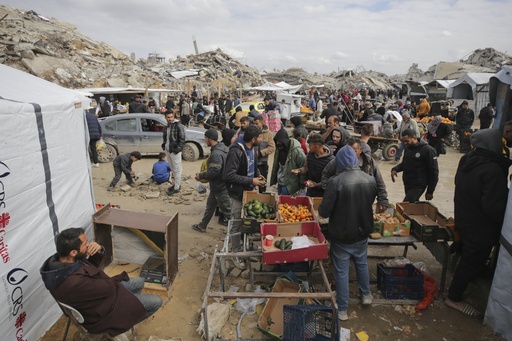Hamas has announced the release of three Israeli hostages this weekend, marking progress in the ceasefire agreement with Israel. This development comes as concerns arise over potential U.S. and Israeli plans that could affect the ceasefire. The announcement was made on Friday following Hamas’s accusations against Israel for allegedly restricting humanitarian aid deliveries to Gaza, which are crucial during this truce period. Israel has not yet responded to these claims regarding the breach of the agreement.
In related news, Iran’s supreme leader made a statement on Friday criticizing the idea of negotiations with the U.S. regarding nuclear discussions. Despite President Trump’s expression of willingness to engage in talks, Ayatollah Ali Khamenei deemed such negotiations as neither wise nor honorable. Although he stopped short of a direct order against engaging with Washington, his comments cast doubt on the future of diplomatic relations.
In the ongoing exchange process, the Palestinian Authority’s commission of prisoners’ affairs revealed the names of 183 Palestinian prisoners slated for release in return for three Israeli hostages. The prisoners include individuals with long sentences and those detained since the conflict escalated on October 7, 2023. Notably, prominent figures such as Iyad Abu Shakhdam, convicted for participating in fatal attacks on Israelis, are among those being released into the occupied West Bank.
Yarden Bibas, the father of the youngest Israeli hostages, expressed despair over his family’s continued captivity, stating that the situation feels bleak without them. He called for the return of all hostages and emphasized the emotional toll their absence has taken on him. His remarks followed the announcement that three more adult hostages are scheduled for release this weekend.
Meanwhile, President Trump characterized his proposal for the redevelopment of Gaza as a simple “real estate transaction.” This assertion has drawn substantial criticism from various quarters, with many questioning the feasibility and morality of the proposal. Trump has suggested that resettlement could be a lasting solution, despite significant skepticism even within his administration.
In border-related developments, Lebanese President Joseph Aoun and Syria’s interim President Ahmad al-Sharaa discussed recent clashes at their shared border. They resolved to collaborate to manage the situation and protect civilians from harm. The fighting has reportedly resulted in casualties, but details regarding the involved militant groups remain unclear. Earlier, Syrian forces had reportedly been engaged in confrontations with Lebanese clans.
Hamas has reiterated allegations against Israel for violating the humanitarian provisions of the ceasefire. They claim Israel has impeded the delivery of vital aid, including shelter and reconstruction materials, critical for the population in Gaza facing dire conditions. An Israeli body responsible for coordinating aid indicated that thousands of trucks had entered Gaza since the ceasefire began, aiming to fulfill the daily requirements outlined in the agreement.
In a separate issue, the newly appointed U.S. envoy for Middle East peace expressed hopes that Lebanon would prevent Hezbollah from joining the government. The envoy emphasized U.S. concerns about Hezbollah’s involvement in governance, while Lebanese officials appeared dismissive of her comments, underlining their complex political environment where various factions vie for influence.
As part of the discourse on international relations, Israel’s foreign minister praised Trump’s actions against the International Criminal Court (ICC), which has attracted global scrutiny over its investigations into alleged Israeli war crimes. The ICC condemned these sanctions, asserting that they threaten the court’s impartiality in upholding justice.
Finally, in a distinct announcement, Iran’s supreme leader reiterated his disapproval of negotiations with the U.S. This statement diverges from previous indications that Tehran might be open to discussions about its nuclear program, complicating the diplomatic landscape further. Iran’s economy is currently under significant strain due to ongoing sanctions, which have prompted internal disagreements about how to respond to the West.
In Gaza, Hamas conducted a funeral for its deputy leader, Marwan Issa, who was killed last year during an Israeli airstrike. A sizeable gathering was held to honor him, showcasing the ongoing significance of the event in Hamas’s military narrative. Concurrently, the Israeli military reported strikes against Hezbollah weapon storage sites in Lebanon, alleging violations of the existing ceasefire.
